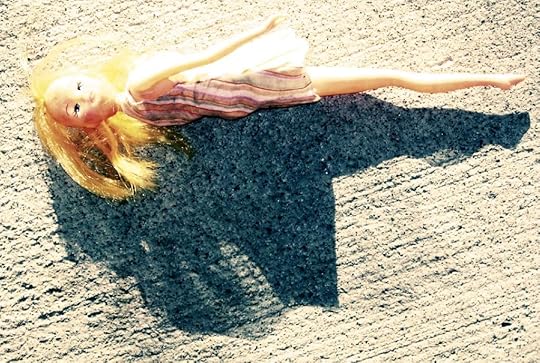Easter War
 “acidic barbie” by Charolotte Kinzie, flickr
“acidic barbie” by Charolotte Kinzie, flickr
At night, in our home, which no longer consists of bedrooms or Mother or my baby sister, my father and I pursue our projects under skies exploding with bright red peonies of fire, with distant yellow daffodils of searing heat and air-splitting rage. We have a roof, still, though it covers only one small room, the only thing sheltering us after the initial pass of bombs, soldiers, and tanks. Miraculously, we have survived. Miraculously, so have others. And we go about on the streets drenched with waters that have quenched aggressions. The bomb sirens have replaced our call to matins, and we wait, with the others, and do what we are able.
We have stayed behind to serve the people and I was not unlike many other older girls who stay behind to help fathers and brothers. My father had been a Protestant minister to a small congregation, but now he performs last rites in the style of whatever faith his townspeople require. My brother and I and Olek, a boy who has stayed behind to fight, have worked to create Easter for the other child soldiers. Olek is a master at carving and so we carve and paint eggs, we make Easter baskets. Most of the young children have fled with their mothers, but older children and teenagers—boys and girls—are here and have been trained in the use of weapons and how to hide and how to find cover.
It has been an age since I lived in Appalachia. I can scarce recall it. My life here blends with our past life there and sometimes they feel interchangeable, and in some ways, they are, especially now. My grandma always called it “hardscrabble.” She is the one who taught me to make things from twigs and branches and sticks. Grandma and I used to put grapevine in the creek under large outcroppings of rock. We would leave it there to soak. In a day or two’s time, the grapevine would be ready for weaving—into baskets, wreaths, pumpkins, suet feeders, lampshades, stars, peace symbols. We sold our wares to tourists.
My grandmother used to say that at a certain age, what a woman needed was baskets, places to contain all the pieces of life, that sorting and ordering were half the battle. So much has been lost to us that I would love to have more to contain. But a basket would not have held my father’s grief, so lost did he look on those first nights after Mother’s death, my beautiful mother he met during a seminary trip to Eastern Europe. Out of their marriage had come me, Daniela; Krystiyan, my younger brother; and my baby sister Katya.
After my father had blessed and cleansed my mother and sister with holy water, he wrapped them in the best linens we could find. He also consecrated our yard where Olek, my brother Krystiyan, and I dug a grave. The bomb that struck one side of the house had made short work of it and so the earth was soft, plowed as it were, and deeply pitted. We laid them in the yard, marked by crosses, a larger one for Mother and a smaller one for Katya.
Father said there wasn’t time to mourn. There were many who needed the comforts of ministrations of prayer and holy water, even if the ministering was over rubble and memorials bereft of remains. The injured, the mourning, and those huddled in shelters needed prayer and food. Every night, Olek carved eggs to give to families with children. Krystiyan, the artist of our clan, painted them with brushes and paints he kept in his rumpled jacket and pants pocket. We took wood from decimated buildings and schools. I took various fibers and plastics for baskets. During the day, we manned our positions with guns, though we sometimes encountered enemy soldiers lying down in the street in surrender in exchange for water and a crust of bread.
My father became convinced the soil soaked with blood that was already drenched in blood would always require light to redeem the people and so he made light in the way he loved everyone. He became light and danced on air. He remembered all names, even those of the enemy who in fatigue and confusion sought creature comforts. He spoke the dreams and fears of his adopted flock so they felt known. Before he died, I came to realize what I had seen, known, and felt.
When the war was over, I would go back to Appalachia. When the war was over, I would put my hands in the cold stream and feel my grandma’s hands on the back of mine, hear her soft instructions to hold the grapevine down in places where it could soften.
Meg Sefton's Blog
- Meg Sefton's profile
- 17 followers



